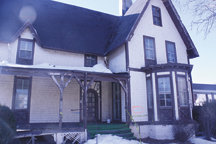Rev. Gregory G. Perez, president/CEO of Windmill Alliance, said he hopes to kick start a program started several years ago to upgrade and centralize its facilities, part of a slightly scaled down plan that would bring a number of its current operations into a central location and provide more room for its ongoing programs.
The program, started in the mid-1980s, was designed to somehow find a way to fulfill the church’s mission to help the community.
Former vicar of Trinity, Reverend Jerry Pisani, in an effort to find ways to minister to the community, asked his congregation who the church might be able to help. A young man with a disability stood up and simply said, “What about us?”
“This is their work and it makes each person feel important.”– Rev. Gregory G. Perez
________
Rev. Perez said the program is designed to pick up where special education in schools leaves off, and provide people with educational life skills that can give them a measure of independence and productivity.
“This program reaches out to people who are often forgotten,” he said. “Many people believe the disabled adult is fine, and that he has a family. But often when a parent dies, even siblings forget about these people. They fall through the cracks in the system. Sometimes, even the state forgets them. We help them have dignity and a sense of identity about who they are. We teach them new skills.”
Three basic programs in one
The Windmill Alliance offers three basic programs: a day program, its HIGHWAYS program, and a residential housing program.
The day program, which serves 37 people, generally runs from 9 a.m. to 3 p.m., Monday through Friday. This is the largest part of the operation, which operates out of Trinity Parish on Fifth Street and Broadway, and receives funding through the N.J. Department of Human Services’ Division of Developmental Disabilities.
“We teach them everything from life skills to arts and crafts,” Rev. Perez said. “Several years ago if you bought a paper mache pumpkin, it was likely made by someone at Windmill.”
The program also includes work for various businesses, including putting labels on paint cans for Muralo Paints, or doing recycling work for the Bayonne Housing Authority.
“We’re always looking for industries to provide us with work,” he said.
This is a huge ego boost for the participants, giving them a sense of joy and pride.
“This is their work and it makes each person feel important,” he said.
The Windmill Residence supervised apartments program provides housing for about 15 individuals.
“They are taken care of 24 hours a day, seven days a week,” Rev. Perez said. “Most of them come to the day program. We have a staff that takes care of them, teaching them how to cook, shop, go to the doctor, wash clothing, and even how to care for their apartment.”
The Alliance also operates the HIGHWAYS (Helping Individuals Gain Hope Will Always Yield Success) thrift store and counseling service, providing clothing, furnishings, counsel, and a food pantry for those in need.
The thrift store – which has two components, a part which sells new or near new items that were donated to the program and a discount used items store – also provides jobs and training for individuals.
Some volunteer to work there and some work through court ordered community service, while some are staff members.
“We used to have furniture at the store, but the van broke about two years ago. So they are unable to go to homes the way they used to in order to pick up furniture to resell at the store,” Rev. Perez said. Attached to this is a food pantry, which feeds more than 1,000 per month.
“Because of the economy, the number of people has gone up,” he said, noting that this program also includes holiday food baskets.
“We buy food from Community Food Bank of New Jersey for about 16 cents per pound,” he said, noting that Boy Scouts, Catholic churches, and synagogues help with food drives, as well.
Windmill also has a social worker who does crisis intervention, and trains people who are looking for work.
Plans for the future
For years, the program has used an old rectory for some of its activities, something they are in the process of knocking down. They will build a one-story building where they can locate other aspects of the program currently located in other parts of Bayonne.
“We’ve had to scale back our plans over the last few years,” Rev. Perez said.
But the program has to move forward because of the number of programs the current church facility hosts, including Narcotics Anonymous and Alcoholics Anonymous, as well as other programs.
“We are still making progress,” Rev. Perez said. “Our capital campaign has not died. The old rectory has been shutdown and soon torn down. What we’re looking for are pledges from the public. This is an investment in the lives of people.”
Through what is being called the “Miracle on Fifth Street Capital Campaign,” the program is hoping to raise $1.3 million for the building construction.
Al Sullivan may be reached at asullivan@hudsonreporter.com.
